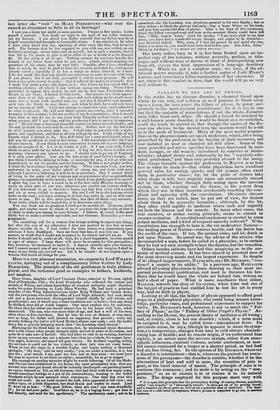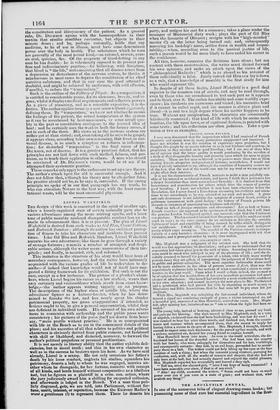FALLACY OF THE ART OF PHYSIC.
IF the reader has an obscure disorder, a chemical friend upon whom he can rely, and a dozen or so of guineas to throw away upon a fancy, he may prove the fiillacy of physic, by going suc- cessively to the most eminent practitioners ; for it is ten to one but that the majority of prescriptions, if not the whole, diametri- cally differ from each other. Or should a friend be attacked by a well-known acute disorder, it would be found on a consultation, could the truth be arrived at, that though the nature of the dis- ease was obvious to the merest tyro, the masters would be a-tilt as to the mode of treatment. Many of the most useful prepara- tions in the pharmacoposia are quack medicines, which, after being proscribed by the profession in the heyday of their inventors, are now imitated as near as chemical art will allow. Some of the most powerful and active specifics have been discoi-ered by acci- dent, savages, or old women ; introduced by empirics or moun- tebanks ; adopted slowly and reluctantly by the " regularly-edu- cated gentleman," and then very probably abused in the using. The charge brought against the profession by BACON is as true now as when he made it—that whilst physicians have excellent general rules for curing, quacks and old women often excel them in particular cures ; for, let the pride of doctors take- what shape it will, very singular cures are occasionally turned out by them, whether through faith acting upon the nervous system, or time wearing out the (Lease, or the potent drug which they use in their nostrum accidentally touching the com- plaint and agreeing with the constitution. Obstinate chronic cases, as they are called, may be put out of view, for doctors admit them to be generally incurable ; although, by the by, they often yield rapidly to medicine where luck and sagacity hit both the disease and the remedy. In many other cases, the real curative, or rather curing principle, seems to consist in counter-irritation. A constitutional excitement is created by some- potent medicine, and a kind of corporal anarchy induced.* If the constitution has strength to bear it, the vis medicatrix Naturoc- the healing power of Nature—restores health, and the doctor has the credit of the cure. If not, the patient sinks, and his death is put upon Nature. So sound was the advice of the satirist, who recommended a man, before he called in a physician, to be certain that he had not only strength to bear the disease, but the remedies.
Others besides satirists have had this misgiving as to the cer-
tainty of medical science. It has been shared by practical men of the most observing minds and the largest experience. In despite of its alleged improvements, NAPOLEON, says Dr.Dicxsorl, "con- tinued a sceptic to its utility." In a previous age, RATCLIFFE advised all young physicians to learn dancing as their most im- portant professional qualification, and used to threaten his bre- thren that he would leave the whole art behind him written on half a sheet of paper. What is more conclusive than either,. BAILLIE, towards the close of his career, when time and one of the largest of practices had enabled him to test his art in every way, had no faith in physic.
Looking at all this, the fallacy of physic appeared to afford good
scope to a philosophical physician, who could bring minute know- ledge, particular cases, and professional experience to support his views. Dr. DICKSON'S book, however, is not so much the " Fal- lacy of Physic," as the " Fallacy of Other People's Physic." Ac- cording to the Doctor, the present theory of medicine is all wrong ; and, in reality, there is but one disorder; which, if a term must be assigned to it, may be called fever—intermittent fever. Its proximate cause, he says, (though he appears to mean its symp- tom,) is temperature, changes from heat to cold always characte- rizing loss of health; and its remote origin, if we understand him rightly, is an action upon the nervous system, either from atmo- spheric influences, external violence, mental excitement, or mor- bid causes continued for a longer or a shorter period, as bad food bad air, free living, &c. In the opinion of Dr. DicKsoN, wherever a disorder is intermittent—that is, wherever the patient has remis- sions of the paroxysms—the disorderis curable, whether it be the alternations of beat and cold in ague, the cessation of pain in gout, or the lucid interval of mania. The principle of cure is to continue this remission ; and its mode is by acting on the " tem- perature," so as to sustain it in or restore it to its natural state. The drugs employed for this purpose must vary with • It is upon this principle that the premonitory feeling of coming disease. popularly, called "out of sorts." or " thoroughly unwell," is often gut rid of by getting drunk, and a disorder cut short quite as well as by a powerful dose of medicine. The fami- liar case of a cold cured by exposure, when a person is compelled to go out, is another. instance. the constitution and idiosyncracy of the patient. As a general rule, Dr. DICKSON agrees with the homoeopathists in their maxim that similia sirnflibus curantur, but objects to their minute doses ; and he, perhaps rationally, holds that any medicine, to be of use in illness, must have some determinate power over the body in health. The substances which he uses are generally of the most potent kind,—as calomel, arsenic, prus- sic acid, quinine, &c. Of the propriety of blood-letting in any case he has doubts : be is vehemently opposed to its present pro- fuse and indiscriminate practice,—for believing, with Scripture, that blood is " the life," and conceiving that all disease arises from a depression or disturbance of the nervous system, he thinks it mischievous in most cases to deprive the constitution of its chief nutritive substance, and that in any case the good attained is doubtful, and might be achieved by medicines, with cold effusion, if needful, to reduce the " temperature."
Such is the outline of the Fallary of Physic. As a compoSition, it is entitled to considerable praise, for its clearness, brevity, and vi- gour, whilst it displays medical acquirements and reflective powers As a piece of reasoning, and as a scientific exposition, it is de- fective. The author applies terms in a new sense without rigorously defining them. By " temperature," we know not whether he means the feelings of the patient, the actual temperature of the system as it can be ascertained by heat-measurers, or some occult qua- lity in the part or constitution analogous to the learned idea of heat ; and he certainly uses the word in both the former senses, if not in each of the three. His views as to the nervous system are rather got at than stated; and, even taking all he says to be gospel, it appears clear, according tohis own reasoning, that fever,in uni- versal disease, is as much a symptom as redness in inflamma- tion; for disturbed "temperature" is the final cause of Dr. DICKSON, not of disease. It is a greater practical defect, that his principles are not laid down with such method, fulness, and pre- cision, as to teach their application to others. A man who should be convinced of Dr. Dicasosr's views, would be at sea if he attempted their systematic practice.
These remarks only apply to the endeavour to set up a new theory. The author's attack upon the old is successful enough. And it does not follow that, although his theory may be altegether false, his practice should not be, as he says it, successful. If the curing principle we spoke of in our first paragraph has any truth, he who can stimulate Nature in the best way, with the least consti- tutional waste, will be the most successful physician.



























 Previous page
Previous page